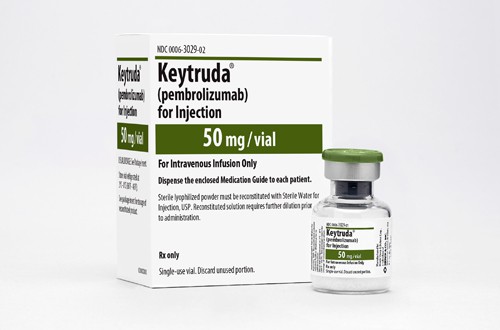
Merck & Co’s already dominant position in the market for cancer immunotherapies for first-line lung cancer looks like it’s set to continue after its PD-1 inhibitor Keytruda aced another clinical trial.
Keytruda (pembrolizumab) has become the first drug in the class to improve overall survival when given in combination with chemotherapy in previously-untreated patients with advanced non-small cell lung cancer (NSCLC).
Interim data from the KEYNOTE-189 study showed that adding Keytruda to Eli Lilly’s Alimta (pemetrexed) plus a platinum drug improved both progression-free survival (PFS) and overall survival, which will reassure physicians, regulators and healthcare payers about the clinical value of the drug in this setting.
That’s important because Merck recently withdrew its marketing application for Keytruda as a first-line treatment alongside chemotherapy for NSCLC in Europe, after the EMA said it wasn’t comfortable reviewing the drug on the strength of phase II data alone. To address the deficiency Merck revamped KEYNOTE-189, recruiting additional patients and adding overall survival as a prospective endpoint.
The data means it can likely move quickly to refile Keytruda in first-line NSCLC in Europe, while in the US – where it is already approved in this setting – the survival data will help the company make an even stronger case to prescribers.
The company hasn’t revealed the top-line data just yet but said Keytruda’s improvement over Alimta and platinum drugs alone was statistically significant. Moreover, the drug hit its objective around a year earlier than expected – Merck was not due to report survival data from the study until early 2019. Merck says it will share the results fully at an upcoming medical meeting.
Leerink analysts said the data will ‘solidify’ Merck’s lead in first-line NSCLC, although they cautioned that there are plenty of other studies that could be a threat, including Roche’s recently-reported Impower150 study of PD-L1 inhibitor Tecentriq (atezolizumab) plus Avastin (bevacizumab) and chemotherapy.
Meanwhile, Bristol-Myers Squibb – which dropped the ball in first-line NSCLC when Opdivo failed a pivotal trial in 2016 – is waiting on the results of its CHECKMATE-227 of PD-1 blocker Opdivo and CTLA4 inhibitor Yervoy (ipilimumab), and AstraZeneca is hoping for better news when its MYSTIC trial of PD-L1 drug Imfinzi (durvalumab) and CTLA4-targeting tremelimumab reports towards the end of this year.




